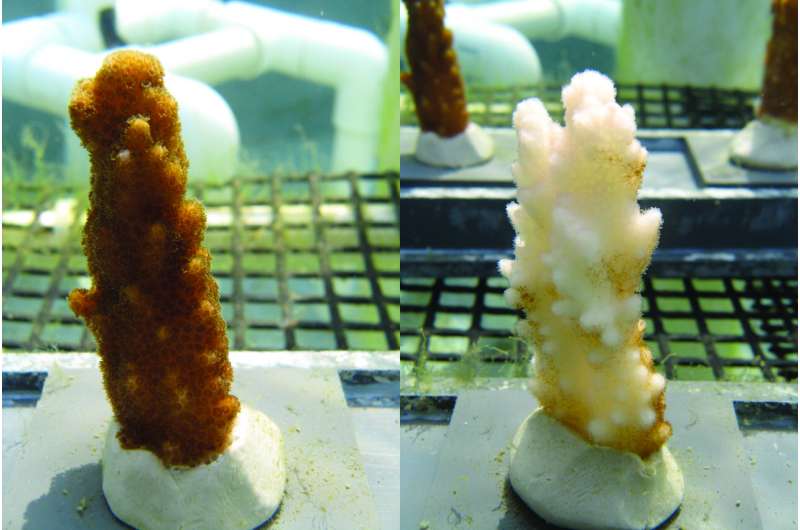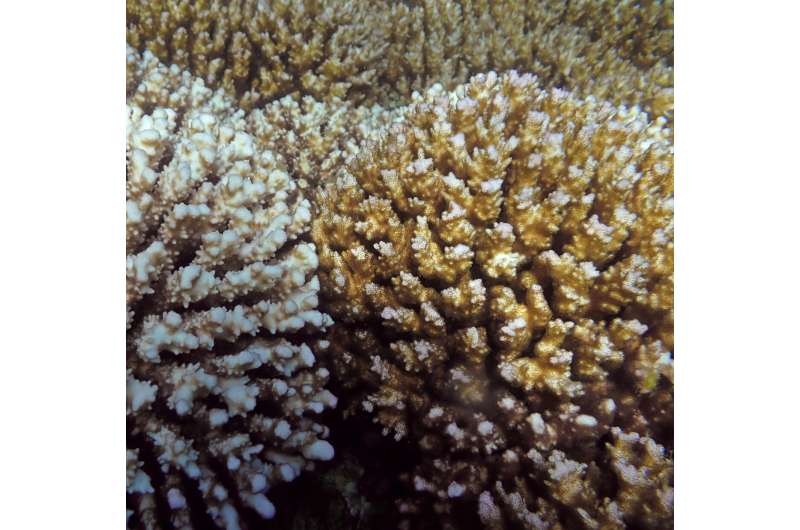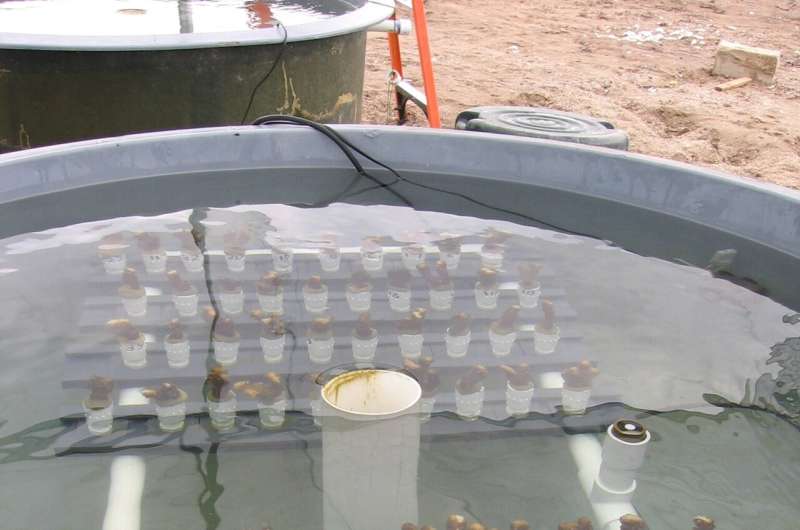This article has been reviewed according to Science X's editorial process and policies. Editors have highlighted the following attributes while ensuring the content's credibility:
fact-checked
peer-reviewed publication
trusted source
proofread
Some corals may survive climate change without paying a metabolic price, scientists suggest

If, as the saying goes, "nothing in life is free," then corals might pay a price for being resilient to climate change. Indeed, the prevailing belief among scientists has been that corals must suffer reduced growth or other tradeoffs when they partner with symbiotic algae that help them tolerate warmer water.
Yet, new research led by Penn State demonstrates that certain corals can have their cake and eat it too, and as a result, these coral-symbiont partnerships may come to dominate reef ecosystems in a climate-changed future.
"Our findings refute the general perception that reef-building corals with thermally tolerant algal symbionts grow poorly," said Todd LaJeunesse, professor of biology, Penn State.
"Instead, these warm-adapted partnerships better tolerate severe marine heatwaves and are likely to expand ecologically and dominate reef ecosystems in the future. While reefs of the future may not look pretty—with low diversity and greatly diminished ecosystem services—the resilient animals left behind will likely continue to provide food and habitat for other animals, and some reef growth to the ecosystems they've created."
LaJeunesse explained that coral reefs are geologic structures created by coral colonies comprising tiny individual sea-anemone-like polyps whose tissues contain dense populations of photosynthetic algae, called dinoflagellates. These dinoflagellates—which researchers call symbionts—vary in their ability to tolerate high temperatures. When the ocean gets too warm, many symbiont species die, and their coral hosts die along with them. And when coral reefs collapse, fisheries, tourism and ecosystem services, such as hurricane buffers, are also at risk.
According to LaJeunesse, the first documentation of differences in coral mortality based on the species of symbiont present occurred in the Eastern Pacific Ocean following the 1997-1998 El Niño Southern Oscillation event when water temperatures were 2–4°C warmer than historical average temperatures. Following that event, he said, corals that hosted Durusdinium glynnii symbionts survived, while corals that hosted Cladocopium latusorum symbionts died.

"Clearly," said Mark Warner, professor of marine science and policy, University of Delaware, "corals that associated with D. glynnii were at an advantage during that extreme heat event, but does hosting these temperature-resistant symbionts come at a cost?"
"Previous research has suggested that the costs of thermal tolerance manifest as reduced nutrient translocation from symbiont to host and significant negative physiological tradeoffs, such as reduced growth and reproductive success. We wanted to know if a similar tradeoff could occur in corals and whether this could affect the fate of coral reef ecosystems."
Kira Turnham, lead author of the study, which is published in Proceedings of the Royal Society B, explained that to investigate possible tradeoffs in thermally tolerant partnerships, the research team compared the growth and reproduction of Pocillopora corals hosting the thermally tolerant D. glynnii symbiont and the more sensitive C. latusorum symbiont.
"These symbioses are common throughout the Indian and Pacific oceans, representing co-evolved and ecologically successful relations," she said.
Specifically, the team measured skeletal growth, total mass increase and calcification rates—or the rate at which corals produce calcium carbonate, which is a measure of their growth. The team also measured reproductive output and response to thermal stress to assess the functional performance of these partner combinations.

"We found that D. glynnii provided the capacity to endure water temperatures that compromise most coral-dinoflagellate mutualisms without noticeable tradeoffs," said Turnham. "This partner combination grows and reproduces just as well as the more temperature-sensitive partnership."
Turnham noted that the differences in performance and function between the two partnerships were apparent only during experimental heating, highlighting the ability of D. glynnii to tolerate higher temperatures and provide heat tolerance to their hosts. The team is also studying similar coral-algal mutualisms involving numerous coral species in the Western Pacific nation of Palau to determine the breadth of these findings.
"This study highlights the contextual importance and incredible biology of coral symbioses," said Turnham. "By investigating the coevolutionary history of the symbioses, providing a contextual lens and using improved symbiont species recognition, we can make more meaningful predictions about the persistence of corals as oceans continually warm from climate change."
More information: High physiological function for corals with thermally tolerant, host-adapted symbionts, Proceedings of the Royal Society B: Biological Sciences (2023). DOI: 10.1098/rspb.2023.1021. royalsocietypublishing.org/doi … .1098/rspb.2023.1021
Journal information: Proceedings of the Royal Society B
Provided by Pennsylvania State University

















